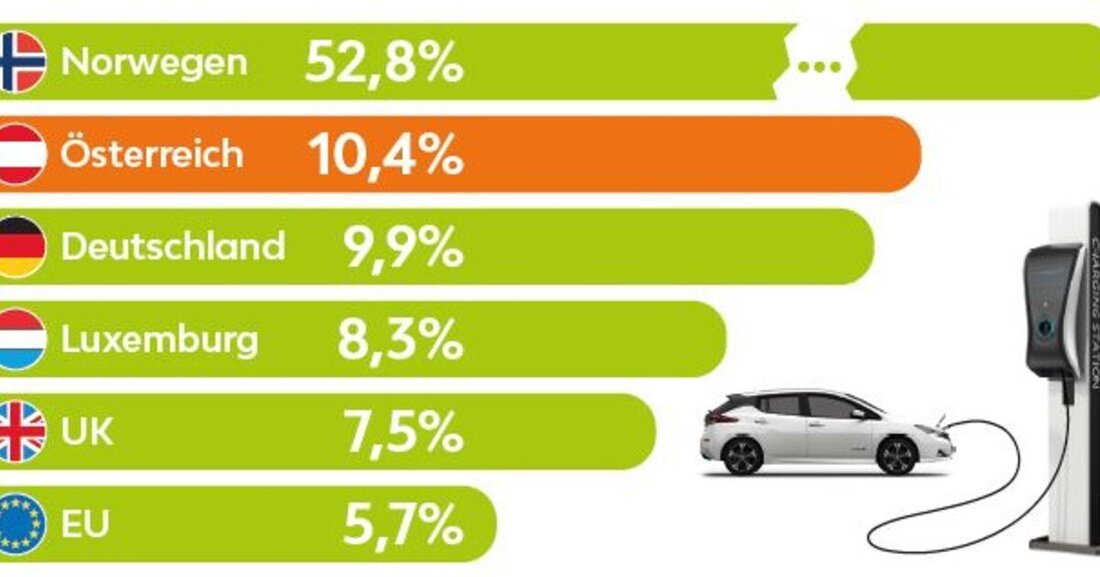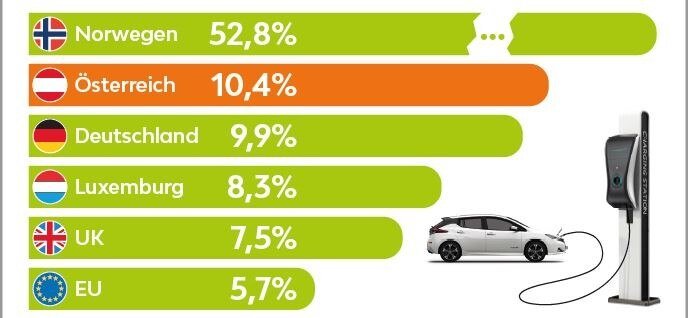E-mobility: Suddenly we are model students
“EV Readiness Index 2021” is the name of the current LeasePlan study on e-mobility in Europe. Austria stands out positively on several occasions.

E-mobility: Suddenly we are model students

Austria's readiness for e-mobility is gaining momentum: The market share of e-vehicles on Austria's roads more than doubled in 2020 and is 8.2% (2019: 3.4% market share). The same development can be seen in the number of public charging points, which rose from 4,200 in 2019 to 8,100 in 2020. Government incentives played a crucial role in this boost: Austria is a leader in subsidies and tax advantages. This is shown by the new edition of the annual LeasePlan study “EV Readiness Index 2021”, which examines 22 European countries for readiness for e-mobility.
Three factors are crucial for this readiness: the maturity of the electric vehicle market, the density of charging options and the total cost of ownership. The LeasePlan study examines and weighs these three key elements. The overall ranking shows that Austria is also on the right track when compared to Europe: Among the 22 countries examined, Austria is in fifth place in the 2020 overall ranking and has moved up one place compared to the previous year. Norway is the European leader, followed by the Netherlands, Great Britain, Luxembourg and ex-aequo Sweden and Austria.
Austria entered 2021 with this positive trend, as current figures from the first quarter show. "Austria has even stepped up a gear when it comes to new electric vehicle registrations this year. Over 6,000 newly registered electric vehicles in the first three months are almost tripling compared to the same quarter of the previous year. This is a record increase, and with an electric share of over 10% of all new registrations, Austria is now in second place in the EU behind Norway. Although this impressive development was probably triggered by the time-limited investment bonus for electric vehicles, it is a “This is a clear signal for the real breakthrough of electric cars on the Austrian market. This in turn creates a clear need for the further expansion of the charging infrastructure,” says Hessel Kaastra, Managing Director of LeasePlan Austria.
Attractive total cost of ownership
A look at the total operating costs shows that e-mobility is not only clean, but now also cheap. Austria's strong support measures, including the e-mobility bonus of up to EUR 4,000 or a reduction in the NoVA registration tax, have a positive effect. When it comes to pure driving costs for 100 kilometers, you pay an average of EUR 3.38 with an electric car and EUR 5.45 with a conventional drive. This means that the electric car is around 40% cheaper.
The acquisition costs vary depending on class and model, but the range of products on offer is constantly expanding. The battery is a crucial factor in an electric car - too small reduces the range, too large increases the price. A new trend towards different battery sizes for the same model gives buyers the opportunity to make individual decisions based on their own priorities in the future. This helps to make e-mobility even more widely available.
Kaastra: "The EV Readiness Index from LeasePlan shows that government subsidies are an important lever for increasing the share of electromobility. If you look at the drive mix, the electric share is still low. It is therefore important to continue or even expand the existing subsidies in order to keep the switch to electromobility attractive."
Leader in the North
LeasePlan's EV Readiness Index shows a comprehensive overall picture of the status of electrification in Europe, which results from the wealth of data collected per country: The top positions in the index are occupied - as in 2019 - by Norway, the Netherlands and Great Britain with the highest overall scores. So you are best prepared for the switch to e-mobility. Romania, Slovakia and the Czech Republic have the lowest values. The infrastructure remains the weak point when switching to e-mobility. Even in the countries with the best overall ranking, charging had low scores.
Government incentives give electrification a decisive impetus. In 2020, more countries followed their words with actions, mostly with new purchase bonuses. A big advantage of electric vehicles is that they are cheaper to maintain: on average, an electricity-powered kilometer costs about half as much (53%) as a fuel-powered kilometer, but prices vary greatly within Europe. When it comes to taxes, electric car drivers pay on average 63% of what gasoline or diesel car drivers pay to the state. However, this advantage is unevenly distributed: In six countries - Austria, Greece, Hungary, Ireland, Poland and Great Britain - e-drivers are given priority and pay no tax at all.

 Suche
Suche
 Mein Konto
Mein Konto